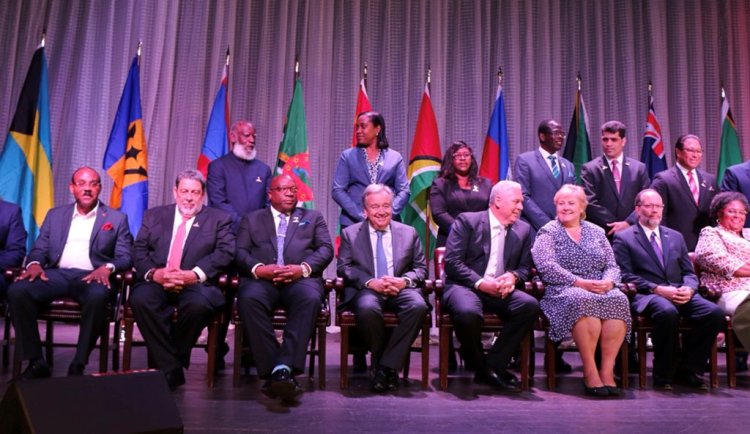UN chief commends CARICOM's vision to make Caribbean first Climate Resilient Zone
Mr Guterres recounted his visit to the South Pacific in May where he saw how “Pacific island nations are addressing the climate crisis” by focusing “a climate lens” on development investments.

- Country:
- St Lucia
To counter global challenges that are a particular threat to vulnerable island nations like those in the Caribbean, it’s vital to “face the headwinds together”, especially in the face of the destruction being wrought by climate change, the UN chief told the annual Caribbean Community (CARICOM) conference in Saint Lucia on Wednesday.
“The beauty of St. Lucia and the uniqueness of the voice and way of life of each of the Caribbean islands is threatened”, said Secretary-General António Guterres on Wednesday at the Conference of Heads of CARICOM Governments gathered to focus on obstacles to sustainable development.
Mr Guterres recounted his visit to the South Pacific in May where he saw how “Pacific island nations are addressing the climate crisis” by focusing “a climate lens” on development investments. He also recalled his visit two years after Hurricanes Irma and Maria wreaked havoc in 2017, when “in only a couple of days”, years of “hard-won development gains” were destroyed in Barbuda and Dominica.
“Hurricanes Ivan and Thomas – and the many others that came before Irma and Maria – are still etched in the memories of Caribbean people” he noted.
As climate-related natural disasters grow in frequency and severity, the UN chief pointed out that “the risks to families and to develop overall will only intensify”.
What the Caribbean has endured makes “abundantly clear” the urgent need to “reduce global emissions and work collectively to ensure that global temperature rise does not go beyond 1.5 degrees above pre-industrial levels”, he continued, inviting government and private sector leaders to come with concrete plans to the UN Climate Action Summit in September, at UN Headquarters, which could result in a 45 per cent cut in greenhouse emissions by 2030 and achieve carbon neutrality by 2050.
“We must massively increase our ambition to advance low-emission and resilient development, including addressing loss and damage from climate impacts”, he stressed, saying “we need all hands on deck”.
We must massively increase our ambition to advance low-emission and resilient development -- UN chief
‘Act daily’ to counter the plastic threat
Mr Guterres signalled the need to “act on a daily basis” to counter the “grave threat” that eight million tons of ocean-polluting plastics are posing to marine ecosystems and tourism sectors.
“From plastic pollution to coastline erosion, more frequent extreme weather events, sea-level rise and biodiversity loss, Caribbean States face immense pressure”, maintained the UN chief.
He commended the “bold vision” of CARICOM leaders, to make the Caribbean the world’s first Climate Resilient Zone and drew attention to the creation of a Caribbean Resilience to Recovery Facility. When completed, it aims to provide a regional indigenous mechanism to source talent, experience and financial solutions for the region, to build resilient communities and nations.
Economic constraints
In addition to managing the recurrent and increasing costs of climate-related events, small island developing States (SIDS) overall, face a range of economic constrictions, from small domestic markets to heavy dependence on imports and high national debt constraints, according to the UN chief.
“These challenges are further complicated by the difficulties SIDS face in mobilizing development finance on affordable and appropriate terms”, he said. The Secretary-General said he backed steps to improve access to development financing; eligibility for Official Development Assistance, including vulnerability criteria in addition to Gross National Income per capita; and speed and predictability of climate financing, especially SIDS.
Mr Guterres threw his “strong support” behind the UN Economic Commission for Latin America and the Caribbean’s (ECLAC) proposal to convert debt to invest in resilience, noting that “to achieve this and other global challenges, we must reaffirm commitment to multilateralism”.
“We must face the headwinds together”, the Secretary-General underscored, “There is no alternative to cooperation and collaboration”.
He urged the leaders to “seize this historic opportunity to ensure that every Caribbean country, and all SIDS, receive optimal support to achieve the Sustainable Development Goals”.
The UN chief drew attention to five UN Summits in September where the “collective voices” of the Caribbean States can “be heard by the global community”.
Moving forward
In closing, he thanked CARICOM for its “strong cooperation” with the UN, welcomed the Counter-Terrorism Strategy for the region, developed with the UN Office of Counter-Terrorism, and recognized its leadership on key UN priorities, “not least climate change and financing for development”.
Mr Guterres commended Caribbean nations’ commitment to foster regional cooperation in fighting illegal drug trafficking and saluted their response efforts to the refugee and migration crisis in the wider region “as a result of the situation in Venezuela”.
“Let us cooperate ever more closely in fulfilling the hopes and aspirations of the people of the Caribbean”, concluded the Secretary-General.
- READ MORE ON:
- CARICOM
- development
- natural disasters
- Climate Resilient Zone
- Caribbean
- climate crisis
- Saint Lucia
- sustainable development
- investments
- UN Climate Action Summit
- greenhouse emissions
- biodiversity
- plastic pollution
- coastline erosion
- Recovery Facility
- SIDS
- ECLAC
- Economic Commission for Latin America and the Caribbean
- Sustainable Development Goals
- illegal drug trafficking










